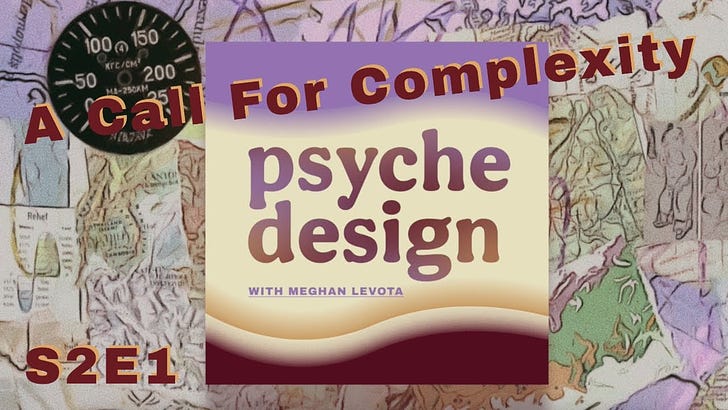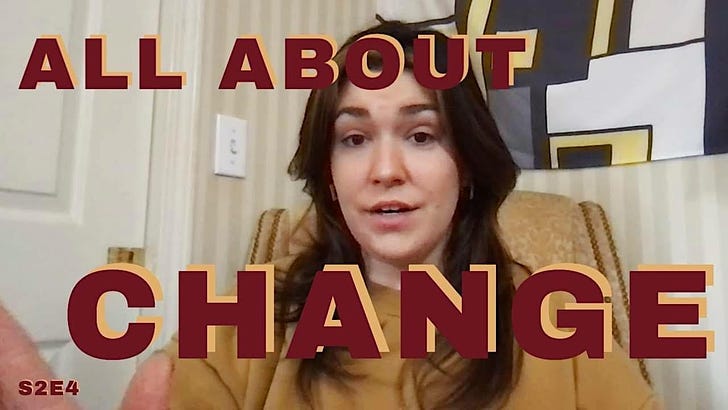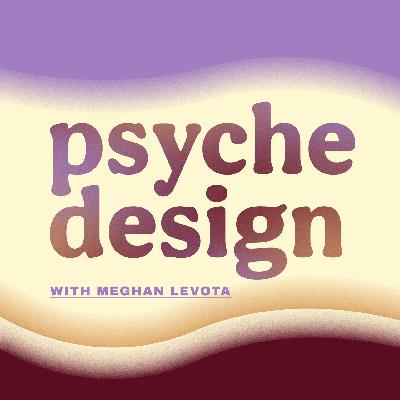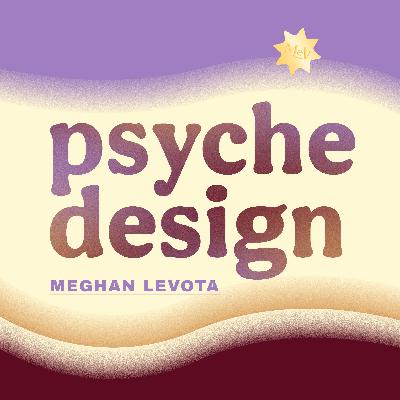A Call for Complexity ~ S2E1 Psyche Design
Description
Transcription:
Hello, my name is Meghan LeVota, and you are listening to the Psyche Design podcast. This is the first episode of season two. And, I'm not fully sure everything that I'm going to talk about in this episode. But for myself, I'm treating it as almost like a personal manifesto of "How I Intend to Talk About Personality Type Moving Forward," and just some general ideas to set the stage.
So, I'm calling this episode a Call For Complexity. Because that is partially what I'm calling for, is a way in which to talk about Carl Jung's theory of Psychological Types — as well as the 16-type model that was popularized by the MBTI (Myers and Briggs), and all of the other systems that have followed.
And I guess what I want to bring up right off the bat, is that Carl Jung himself was pretty long-winded and convoluted, one could say. And in the book, Psychological Types, he talks a lot about the problem of opposites, and how opposites interact with one another, and what to do about it, and what problems that gives society dealing with those opposites. And then at the end of the book, he goes into the eight cognitive functions, which I'm not going to go into what those are just yet. So if you're new to personality type theory, and you want to know what these functions are, you might want to check out another episode.
But for those of us who have been in this personality bubble for a while, basically, the way I see it is, Carl Jung talked about the psyche, in quite a complex way, too. And, you know, interestingly enough, he wanted his theory of Psychological Types to be something that the layperson can pick up and use. However, in the way in which he explained things, it was not very easy for a lay person to pick up and use, what did people do, they jumped right to the section about the categories. And they just read about the categories and skipped over the beginning part, I've been guilty. I'm guilty of this literally when it comes to reading that reading his book. And I think that, you know, based on how the ego works, according to Jung and psychology, this shouldn't be that surprising that our ego is automatically going to go toward the information in which we, our ego feels like we can use something from it. Whether this is our self-concept, we're going to understand ourselves better. Or other people, maybe we want to get along with other people better. And so even though Carl Jung had hopes that his book Psychological Types would be able to be used for the layperson to be able to figure out how they are dealing with their problem of opposites, in instead went over a lot of people's heads. And I'd like to argue that it's going over our heads right now. I'm not even trying to claim that it hasn't gone over mine, I just want to bring out right off the bat, that the guy is pretty dense when he writes and not all of us have read all of it through.
And I'm not even a Jungian purist here. However, I am someone that philosophically aligns more with Jung than Freud. And I tend to agree with his philosophy on the psyche in the shadow a little bit more so than, like mainstream modern psychology. And so, whenever the Myers Briggs came to be, it was inspired by Psychological Types. And it went with the categories that Carl Jung proposed with the eight cognitive functions and it uses his theory about how we have a dominant and we also have an auxiliary function and then we have an inferior function that is opposite to our Dominant function. The MBTI was able to put those categories and use his theory and turn it into 16 types Next. And there are there are some debates and whether or not Carl Jung agreed with the MBTI. And there's some debate and whether or not the two systems even can work well together. But for most of us in 2022, for learning about personality, we're probably first learning about it through the lens of the 16 types. And then if you get more interested in the background, then you go back and look at some of the depths and the complexity behind it.
And I guess what I want to bring up is that. So the MBTI definitely succeeded at reaching the layperson, way more than Carl Jung did. I think we can agree on that. However, right now, in 2022, if you're familiar with the site, 16 Personalities — that is a very popular online quiz that a lot of people will go and take to figure out what their personality type is. While the 16 Personalities is not actually Jungian-based typology theory — it's actually trait-based, it has nothing to do with the MBTI. And so it's a fundamentally different theory, than the, you know, the 16 Jungian types, the type patterns. And so you also could argue that 16 Personalities did a better job at reaching the layperson. But at what cost?
Well, I'm not even saying that there's anything wrong with it, necessarily. The cost, some could argue that the cost that there might be, you know, that it's not factually as true or holistic, maybe they see some ethical problems with a pressure to stereotype things or put people in boxes. Um, but it's not the way that Carl Jung described it, it's a completely different theory. But it's ... almost using his credit, credibility, or authority in order to, you know, make this site. And I'm not arguing that the MBTI did this with Jung, in theory. But I am saying that just because something is easier for a layperson to, in general, understand... and just because you're able to describe it in a more simple and engaging way, doesn't necessarily mean that it's more correct.
And, in my opinion, the 16 Personalities quiz, it tries to mix... Well, this part isn't an opinion it's true. It's true that it uses the Big 5, which is a pretty popular trait-based model in psychology. It kind of uses that, but then uses some of the same verbiage that the MBTI uses such as thinking and feeling. Ya know, I'm pretty sure that the MBTI has said before that they regret not trademarking, their names like ENFJ, INFJ, and whatnot, because they're upset for the end, because basically, the 16 Personalities is using their credibility of those keywords.
And the type code, however, like, I, personally am happy that the Myers Briggs did not trademark those names, because, you know, even Carl Jung himself, he was talking about things like thinking versus feeling, sensing versus intuition which these have existed as these concepts had. These concepts have existed as dichotomies, even before Carl Jung, he just identified them. And so I think it would be kind of silly for someone to trademark the idea that there's a dichotomy because anyone can perceive them. It would be like trademarking the idea of light versus dark. I mean, that's just one way of looking at it. And so I feel like everybody should have the right to talk about things such as feeling versus thinking, introversion versus extraversion, and any other dichotomy that might exist in the world. And as reflected in our psyches.
Um, but I think that there has been almost like a feeling that in order to get this across, we have to be as simple as possible, or else people won't understand. So now I want to critique the idea of talking to a layperson in general. Because who even is a layperson? What does that mean?
I guess you could say it means somebody that's not super into psychology. But think about where we're at right now. In 2022. With a computer at our fingertips, no matter where we go, most of the time, for most of us, we can Google anything we'd like. A lot of us become experts in things that we don't officially have a degree in.
And we're exposed to so much information to where I'm a lay person in the 1920s is quite different than a layperson in the 2020s.
Because what, when you also think of layperson, maybe you're thinking what would be like a commoners job, or like the most normal occupation? Well, at least in America, a lot of our manufacturing jobs have gone overseas. So the layperson in America is working in an information economy, in a knowledge economy. We're even things like customer service that involve working with people. And so a layperson when in Jung's time, would have more probably been someone that had a job in which they were told what to do. And they didn't have to think much more beyond that.
However, I don't think that a lot of us in 2022 have the privilege to be able to do that. So bringing me back to all this, I've been sitting with the question of, maybe there's a reason why Carl Jung introduced the eight cognitive functions in the way in which he did and in the order in which he did, it seems like a lot of us and the MBTI included, they read, you know, Psychological Types and thought, you know, this is really interesting. However, you're losing me a bit Jung, like you're talking so much about all the stuff that I don't care about, get me to the categories. And so that's basically what a lot of these type models have done, is want to quickly get to why someone would want to hear about what they're saying, and explain it in a way where it's quick and snappy, and you're able to add value quickly.
And we see the sentiment, this whole sentiment of trying to cut through the fat, and get right to like this point, that might be convincing for someone. We see this all the time in sales, and in marketing. And I think that with so much information in 2022 that we are all sifting through… I know a lot of us work from home, I work from home, I feel like I'm sitting behind a computer a lot. I read recently the other day, that apparently the average person sees, could see up to 10,000 advertisements per day, in 2022. So, and in contrast, in the 70s, that number was more like 500 to 1000. So there's a lot that we're trying to sort through, there's a lot of information that we're juggling all at on








